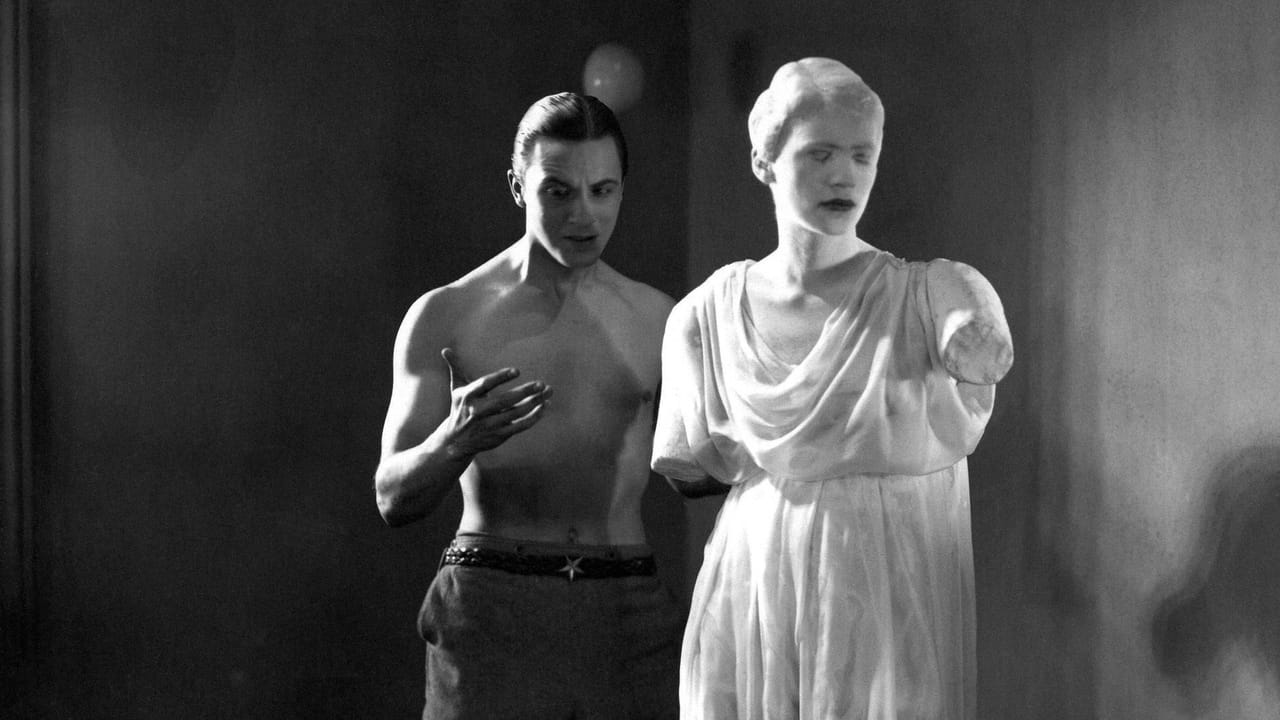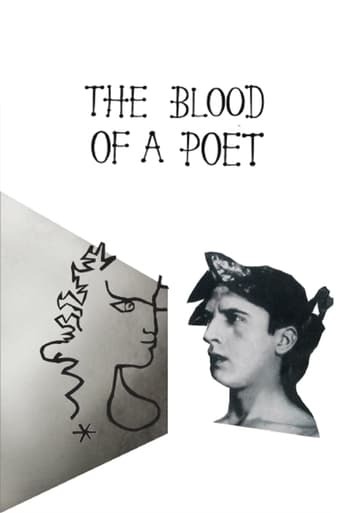

Spoiler Alert -- This appeared to portray a young man's suppression of his own sexuality.I was instantly sucked in to the exploration of his own identity.Standing half-nude, drawing a portrait of himself.Being sucked into a mirror (himself).Delving into bizarrely imaged fragments of his past.The scene with all the young boys fighting.The death of his true self.The emergence of a statue, immortal. Which was portrayed as a woman.-- This is what I grasped from the movie.I highly recommend, if you are into surrealism.10/10
... View MoreHeading home a few nights ago,I got a phone call from my dad telling me that he had picked up something special which he expected I would like taking a look at.Not having a clue what to expect,I was thrilled when I realised that he had picked up about 40 different "Euro-Art Films in Widescreen on Video! (I later found out that he had picked each movie up for 50p,thanks to the seller at a pawnbroker's shop being about to bin them all,due to them being "Videos")Checking the running times of the films,I discovered that the first film by Jean Cocteau, (who,thanks to a Ridley Scott audio commentary,I found had directed a magical adaptation of Beauty and the Beast,which I had watched a number of times during my childhood) was the title with the shortest running time in the collection,that led to me deciding that my first "choice" from the collection of Euro-Art Films, (which still contained a receipt from HMV in 1994 for 17 pounds 49p!) would be Cocteau's first movie.The plot:Part 1:The Wounded Hand:Being unhappy about a painting that he has been attempting to draw,a poet is startled when the mouth of the painting starts to move.Quickly rubbing out the painting,the poet finds out that his plan to destroy the painting has gone a bit awry,when he notices that the paintings mouth has transferred to one of his hands.Horrifed,but also fascinated by this weird incident,the poet experiments with the mouth,until he ends up transferring it from his hand to the face of a statue.Part 2:Do The Walls Have Ears?:Finding the now talking statue to have a hypnotic like quality,the poet follows it orders by stepping into a hotel placed in an alternative like universe named:The Hotel of Dramatic Follies.Being horrified over the scenes that he witnesses of peoples follies,the poet shoots himself to get free from the statue's control and ends up smashing the statue into a thousand pieces.Part 3:The Snowball Fight:Since having smashed the statue to bits,a new statue has been build in the former's place,celebrating the poet that destroyed the old statue.Playing snowballs near by the statue,a young boy is killed,when a snowball containing marble hits him.Part 4:The Profanation of the Host: After dying,the boy's body lays under a table where some card sharks are playing,as his guardian angel attempts to absorb the boys soul,and the mystical power of the once broken statue seems to be getting more powerful than ever before.View on the film:For what would turn out to be the last film that he would make for 13 years,mostly related to the studio having to hold back from bringing the movie out for 2 years,due to all of the controversy that came from their 1930 Luis Bunuel and Salvador Dali collaboration film:L'age d'Or.Writer/director/narrator Jean Cocteau does a clever mix of using "the poet" struggles with his artwork, (which includes an eye-brow raising scene,of the poet laying in bed with the paintings talking mouth on his hand,that he decides to "experiment" with, by placing the hand somewhere on himself that is out of frame (my guess being a sore knee) as a foundation for the more surreal images,with Cocteau showing that no matter how much he tries,the poet is unable to be separated from his work,to the point where a statue inspired by him,takes the places of a statue that he himself created.Along with the poet's struggle with art,Cocteau makes The Hotel of Dramatic Follies a terrific place to explore,filled with opium smokers and hermaphrodite's,whilst also turning the winter wonderland of The Snowball Fight into a wickedly dark nightmare tale.Creating a feeling that the movie is building towards a wildly surreal,dream/nightmare-like ending,Cocteau sadly stumbles during the last section of the film,by not featuring the presence of Enrique Riveros as the poet,which leads to the ending feeling unfocused and completely disjointed to what had taken place in the rest of the film.
... View MoreHere's my interpretation. As a young man, the artist, as the bully, killed a boy (the snowball fight) and covered it up. As he grew, he became an artist, not interested anymore in fighting (the artist ignoring the battle outside), a consequence probably of his conscience. He became involved with a woman (the statue, the card player) who knew nothing of his past. This, I think, is so deep and meaningful, that we never know the history of the person we are with unless they choose to share it. The artist is so filled with self-loathing that he commits suicide. This explains the revolver, and even the firing squad. The mirror, the reflection of ourselves, draws the artist into his own mind where he has trouble escaping. While there, he views many escapes for himself, including death, opium, flying away (a fantasy).The mouth on the hand seems to me much more symbolic of narcissistic behavior. It is masturbatory. This concept is fortified such various elements as the artist being half-dressed, showing off, and even the hermaphroditic scene. The artist lives in a world of self-love but it cannot bury the past, the killing of the boy, which haunts him.I do not know if Cocteau drew on his own experience here, or if this was anecdotal to his life, or even if it was imagination.Anyway, just some food for thought!
... View MoreI was dubious about Cocteau as a filmmaker since, as a poet, he was one of those laughably bad frauds that the decadent inter-war years of Europe produced, trying to be Surreal, when all that really meant was his writing was puerile, half-hearted, and soaked with clichés. He loathed the king of the Surrealists, Andre Breton, whom he sought to displace, and their antagonism has gotten both bad writers more play than anything either ever wrote did. So, it was no surprise that Cocteau's initial filmic offering was as bad- or worse, as his verse. Perhaps the only valuable thing that such a pretentious, self-conscious, hodgepodge can offer is some historical continuity with and context for later student arts films and the Warhol Factory films of the 1960s, which were, it should be stated, far more evocative with far less attempted. As 'art', though, Cocteau's film is virtually worthless.Apologists claim that such a film is beyond like or dislike or good or bad, but having recently watched Werner Herzog's early Even Dwarfs Started Small, a film that really fits that description, I can say that The Blood Of A Poet is not like that film at all because Herzog's film a) presented itself as art, b) was not a vanity project, and c) was well made- despite a limited budget. Cocteau's film was amateurish, even for its day. Silent filmmakers had done wonders on screen that dwarfed what Cocteau did- even if a budget limited him. Instead, Cocteau was content to take the lazy way out, tossing meaningless faux symbolism at the screen, so the viewer does all the work the lazy artist refuses to do. This is an old and tiresome tactic many bad artists employ, and makes the film definitively a work of bad art, if art at all . The truth is that this film feels more like a rejected Monty Python or early Saturday Night Live skit, or something that, were it not for its dogged and pretentious defenders, would make great fodder for the old Mystery Science Theater 3000 crowd. Yes, the poseurs (you know who they are) will masturbate over this unabated tripe, but even worse than its pretentiousness and banality is that the film is just plain old dull, as in BORING! One need only look to America, a few years earlier, to see the silent films of Buster Keaton, to get a sense of a true Surrealist filmmaker who learned to tame that tendency into real storytelling- i.e.- have a philosophy serve a greater purpose than its mere claims. Having long known and loved Keaton, I can state, definitively, that Jean Cocteau is no Buster Keaton. After watching The Blood Of The Poet I'd even settle for this film and its maker being Diane Keaton. Ah, such things that dreams are made of.
... View More